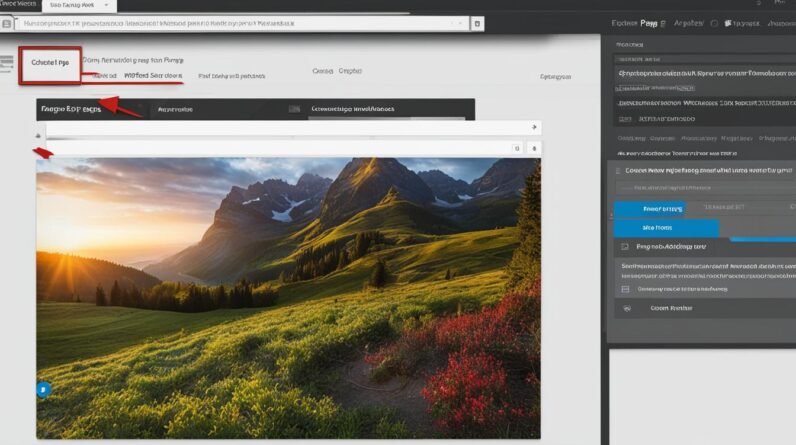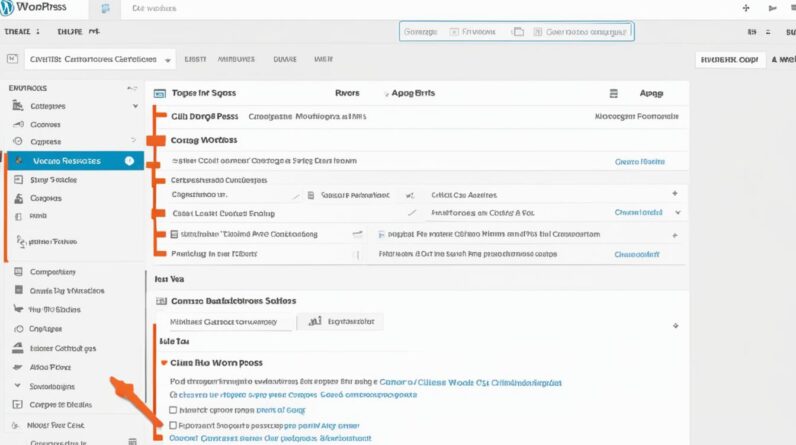If you run a multi-author WordPress blog or value privacy and focused content, you may want to remove the author name from your WordPress posts. In this article, I’ll guide you on how to hide the author name using different methods.
How to Make Money with YouTube
Create an empire of automated video websites for multiple streams of income
Key Takeaways:
- Removing the author name from WordPress posts can be beneficial for maintaining privacy or creating a consistent blog appearance.
- The WPCode WordPress plugin is a recommended method for easily hiding the author name by adding custom CSS code to your theme.
- If you’re using a block-enabled WordPress theme, you can edit the WordPress meta data to remove the author name from specific templates.
- Creating a generic author name is another workaround that allows you to maintain consistency and anonymity for your blog.
- Don’t forget to disable author archives using a plugin like All in One SEO to ensure a complete hiding of the author’s name.
Now, let’s dive into the methods and learn how to hide the author name in your WordPress posts.
Why Hide the Author Name in WordPress?
There are several reasons why you may want to hide the author name in WordPress. It can be useful if multiple staff members collaborate on a post, as it would be unfair to credit only one author. It can also make your website appear more consistent if you have guest bloggers or manage a multi-author blog. Removing the author name can also be beneficial for privacy reasons or if you want to maintain a neutral voice for your blog.
Benefits of hiding the author name:
- Allows for fair credit in collaborative posts
- Ensures website consistency with guest bloggers or multi-author blogs
- Enhances privacy and anonymity
- Maintains a neutral voice for the blog
Method 1: Using the WPCode WordPress Plugin (Recommended)
If you’re looking for the easiest and recommended method to hide the author name in your WordPress posts, the WPCode WordPress plugin is the way to go. This plugin allows you to add custom CSS code to your theme without the risk of breaking your site. With just a few simple steps, you can hide the author name and maintain the desired appearance of your posts.
Here’s a step-by-step guide on how to use the WPCode WordPress plugin to hide the author name:
- Install and activate the WPCode WordPress plugin from the official WordPress repository or by uploading the plugin file manually.
- Navigate to the WPCode settings page in your WordPress dashboard.
- Create a new code snippet by clicking on the “Add New” button.
- Give your code snippet a descriptive name, such as “Hide Author Name”.
- In the “Code” field, enter the custom CSS code to hide the author name. You can target the specific class or element that controls how the author name is displayed in your theme. For example:
| Custom CSS Code |
|---|
.author-name {display: none;} |
5. Once you’ve added the custom CSS code, save the code snippet.
That’s it! The WPCode WordPress plugin will automatically apply the custom CSS code to your theme, hiding the author name in your WordPress posts. You can now enjoy a cleaner and more streamlined appearance for your content.
Note: Make sure to test the changes on your live website to ensure they are applied correctly. It’s also recommended to create a backup of your website before making any modifications to your theme or using plugins.
Method 2: Editing WordPress Meta Data (Block Themes)
If you are using a block-enabled WordPress theme, you have the flexibility to remove the author name from any template by editing the WordPress meta data. This method allows you to customize the display of the author name specifically in block themes.
To remove the author name, follow these steps:
Step 1: Access the Theme Editor
- From your WordPress dashboard, navigate to Appearance and click on Theme Editor
- Select the Theme Files on the right side of the screen
- Locate and click on the template file that corresponds to the specific template, such as index.php, single.php, or archive.php
Step 2: Remove the Author Name
- Once you have opened the template file, find the line of code that displays the author name
- Delete or comment out this line of code using HTML or PHP comment tags
Step 3: Save the Changes
- After removing the author name, scroll down and click on the Update File button
- Verify the changes by visiting your website and checking the specific template where you made the modification
By editing the WordPress meta data, you can effectively remove the author name from your block themes, providing a cleaner and more tailored user experience. Remember to save the changes after each modification you make in the theme editor.
Removing the author name in block themes by editing WordPress meta data
Method 3: Create a Generic Author Name (Workaround)
If you want to hide the author name in WordPress but still maintain consistency and anonymity for your blog, you can use a workaround by creating a generic author name. Although this method does not completely remove the author’s name, it allows you to use a generic username for all your posts.
To implement this workaround, follow these steps:
- Create a new user with a generic username, such as “Guest Author” or “Anonymous Writer”.
- Assign this generic user as the author for all your posts.
- Save the changes, and the author name will be replaced with the generic username on all published posts.
By using a generic author name, you can effectively hide the original author’s identity and maintain a consistent appearance across your blog.
Note: Keep in mind that while this method hides the author’s name from viewers, it does not remove the author name from the backend of WordPress. The original author’s name will still be visible to administrators and in other areas of your website.
Removing Author Archives
When you hide the author name in WordPress, it’s important to also disable the author archives. Author archives are pages that list all the posts written by a particular author, and they can still be found by search engines. To disable author archives, you can use the All in One SEO plugin and configure the settings to remove author archives from search results.
Disabling author archives is crucial for improving WordPress SEO and ensuring that search engines don’t index and display author-specific pages. By using the All in One SEO plugin, you can take control of your website’s SEO settings and enhance its overall performance.
Below are the steps to disable author archives using the All in One SEO plugin:
- Install and activate the All in One SEO plugin from the WordPress plugin repository.
- Go to the All in One SEO settings in your WordPress dashboard.
- Navigate to the “General Settings” tab.
- Scroll down to the “Advanced” section.
- Find the option labeled “Author Archives” and toggle it to “Disabled”.
- Click “Save Changes” to apply the settings.
By following these steps, you can effectively disable author archives in WordPress and improve your website’s SEO. With author archives removed, search engines will focus solely on the content of your posts, contributing to a more cohesive and optimized website.
Conclusion
Hiding the author name in WordPress can be a valuable strategy for various reasons. Whether you want to maintain privacy, present a unified voice, or credit a team of authors, there are several methods you can employ to remove the author name from your WordPress posts.
By utilizing plugins like WPCode, editing meta data in block themes, or creating a generic author name, you can easily hide the author name and tailor the display of your content to meet your needs. Additionally, disabling author archives will ensure a consistent hiding of the author’s name and maintain your desired level of anonymity.
Remember, the ability to hide the author name gives you flexibility and control over the presentation of your content. Whether you’re managing a multi-author blog or simply prefer to focus on the content itself, these methods will allow you to take full advantage of WordPress’s customization capabilities.
Start Hiding Your Author Name Today
Now that you know how to hide the author name in WordPress, you can take immediate action to implement these methods and enjoy the benefits they bring. Embrace the power of WordPress customization and create a seamless and personalized experience for your readers.

| Methods | Benefits |
|---|---|
| WPCode WordPress Plugin | Easy to use and allows for custom CSS code |
| Editing WordPress Meta Data | Works well with block themes and provides customization options |
| Create a Generic Author Name | Maintains consistency and anonymity for your blog |
Additional Resources
If you found this article helpful, you may also be interested in learning more about best drag and drop WordPress page builders or how to make money online blogging. These additional resources can provide further guidance and insights for your WordPress journey.
| Drag and Drop WordPress Page Builders | Make Money Online Blogging |
|---|---|
|
|
Frequently Asked Questions
While this section does not contain any specific FAQs, I understand that you may still have some questions regarding hiding the author name in WordPress posts. Allow me to address a few common queries:
Q: Can I hide the author name only on certain posts and not all of them?
A: Absolutely! All the methods mentioned in this article allow you to customize the display of the author name on a post-by-post basis, depending on your needs. Whether you want to hide the author name on a specific category, tag, or even individual posts, you have the flexibility to do so.
Q: Will hiding the author name affect my website’s SEO?
A: Hiding the author name itself does not directly impact your website’s SEO. Search engines primarily focus on content relevance, user experience, and other factors while ranking websites. However, it’s worth noting that removing the author name may affect the perceived credibility and transparency of your blog, so it’s important to consider the implications carefully.
Q: Are there any other benefits to hiding the author name?
A: Absolutely! Hiding the author name can be particularly useful for maintaining a consistent brand image, enhancing privacy, or creating a unified voice for your blog. It can also be beneficial if you have multiple authors contributing to your website or if you prefer maintaining an anonymous presence.
Remember, regardless of your reasons for hiding the author name, it’s essential to ensure that your website provides a positive user experience and delivers valuable content to your audience.
FAQ
What are the reasons for hiding the author name in WordPress?
Hiding the author name in WordPress can be beneficial for maintaining privacy, presenting a unified voice, or giving credit to a team of authors on a multi-author blog.
How can I hide the author name using the WPCode WordPress plugin?
To hide the author name using the WPCode plugin, install and activate the plugin, then add custom CSS code to your theme using the class that controls the display of the author name.
How can I remove the author name from WordPress meta data in block themes?
To remove the author name from WordPress meta data in block themes, access the theme editor and edit templates such as index, single, or archive to customize the display of the author name.
Can I create a generic author name to hide the author’s name in WordPress?
Yes, creating a generic author name is a workaround to hide the author’s name. By creating a new user with a generic username and setting it as the author for all your posts, you can maintain consistency and anonymity for your blog.
How can I disable author archives in WordPress?
To disable author archives in WordPress, you can use the All in One SEO plugin and configure the settings to remove author archives from search results. This ensures a consistent hiding of the author’s name.






